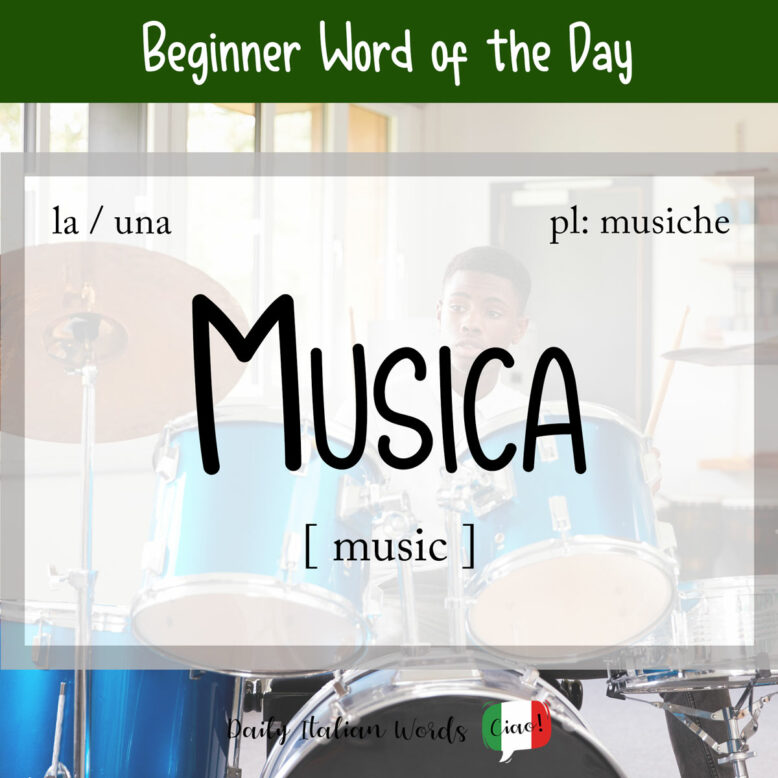The Italian word for music is the similar sounding musica (feminine, plural: musiche). Both words can be traced back to the Greek mousikē (tekhnē) which means (art) of the Muses.

Like the English word, musica is used to talk about not only the combination of melodic vocals and sounds itself, but also the art of composing or performing music. (Note that there is a separate term for sheet music, which is spartito.)
The following verbs are often seen in the company of the word musica:
- ascoltare musica = to listen to music
- studiare musica = to study music
- comporre musica = to compose music
- scrivere musica = to write music
- fare musica = to make music
Note: If you want to say to play music, you should use the verb suonare. Although you can say suonare la musica, it is more common to use suonare on its own because musica is implied.
Mi piace ascoltare la musica mentre faccio le pulizie di casa.
I like listening to music while cleaning the house.

Some of the most popular kinds of music include:
musica rock
rock music
musica classica
classical music
musica pop
pop music
musica country
country music
musica dance / da ballo
dance music
musica lirica
opera music
musica strumentale
instrumental music
musica di sottofondo
background music
musica jazz
jazz music
musica rap
rap music
Musica can also refer to a band (particularly a marching band) or a concert.
Stasera c’è musica in piazza. Vuoi uscire con noi?
Tonight there is a concert in the square. Do you want to go out with us?
Musica doesn’t always have to refer to arranged vocal or instrumental sounds – it may also denote any sound perceived as pleasing to the ear.
For example, if you wanted to sound poetic, you could say la musica delle onde (the music of the waves) instead of il rumore delle onde (the sound of the waves).

Curiously it can also assume the opposite meaning of an unpleasant or out-of-tune sound such as cars racing along the street or dogs barking.
La musica dei cani continuò fino alle tre di notte.
The sound of the barking dogs continued until 3 a.m.
You can use musica figuratively in the following idiomatic expressions to describe a situation that has become monotonous and boring because it has gone on longer than necessary:
- Bisogna cambiare musica. = It’s time for a change. (lit: It is necessary to change the music.)
- Quando finirà questa musica? = When will this situation end? (lit: When will this music end?)
And in some cases, it can denote any kind of situation, boring or not, as in the following expressions:
- Questa è un’altra musica. = It’s a completely different matter. (lit: This is another music.)
- È sempre la solita musica. = It’s the same old story. (lit: It’s always the same music.)
Musichetta, which is the diminutive of musica, may refer to a short and light-hearted piece of music, or a song of little artistic value. For example, if you are put on hold while on the phone, you may be forced to listen to an annoying piece of musichetta d’attesa (lit: waiting music).
This article is also available in video format on our YouTube channel. The audio version can be found on Podbean, Google Podcast, Apple Podcast and Spotify.
Heather Broster is a graduate with honours in linguistics from the University of Western Ontario. She is an aspiring polyglot, proficient in English and Italian, as well as Japanese, Welsh, and French to varying degrees of fluency. Originally from Toronto, Heather has resided in various countries, notably Italy for a period of six years. Her primary focus lies in the fields of language acquisition, education, and bilingual instruction.


